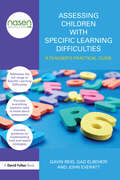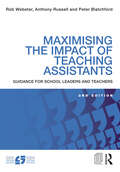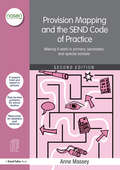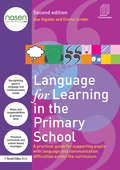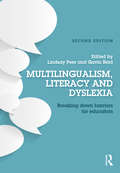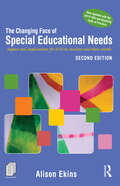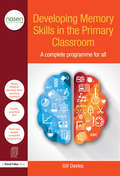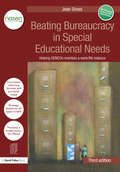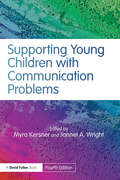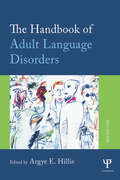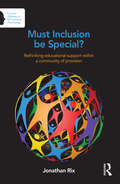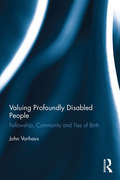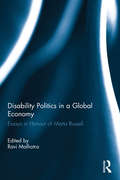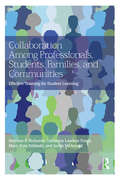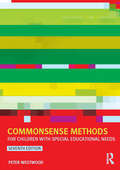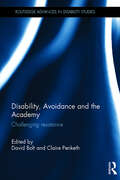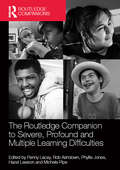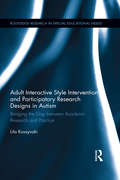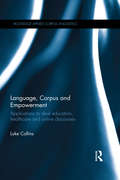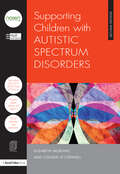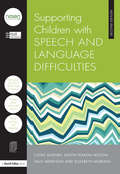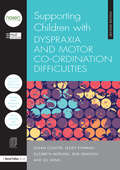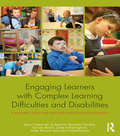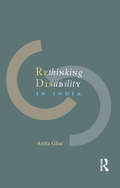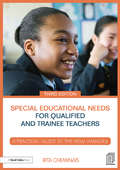- Table View
- List View
Assessing Children with Specific Learning Difficulties: A teacher's practical guide (nasen spotlight)
by Gavin Reid John Everatt Gad ElbeheriThis comprehensive book provides all the information that practitioners need to know about assessment in relation to their pupils with Specific Learning Difficulties. The why, how and what of assessment is addressed, whilst the link between assessment and intervention is also a key focus. Looking at the full range of Specific Learning Difficulties, this book provides practical guidance on implementing strategies that are tried and tested for use in any classroom, whilst also acknowledging that assessment is a process involving other professionals and parents. Addressing issues and topics common in inclusive classrooms around the world, key topics covered include: Specific Learning Difficulties in context Teacher Assessment in literacy, numeracy and movement Motor development and co-ordination Attention factors in learning The key issues on learning differences Self-esteem and emotional literacy How to enhance skills and the self-sufficiency of teachers Assessing Children with Specific Learning Difficulties will be an invaluable guide for classroom teachers, learning support departments, psychologists and other professionals.
Maximising the Impact of Teaching Assistants: Guidance for school leaders and teachers
by Peter Blatchford Anthony Russell Rob WebsterTeaching assistants are an integral part of classroom life, yet pioneering research by the authors has shown schools are not making the most of this valued resource. Evidence shows the more support pupils receive from TAs, the less academic progress they made. Yet the reason for this has little to do with TAs. It is decisions made about them by school leaders and teachers that best explain this provocative finding. The fully updated second edition of this book draws on the experiences of schools that have put this guidance into action via the Maximising the Impact of Teaching Assistants programme. Revised to reflect the latest research evidence and changes within education, including the 2014 SEND Code of Practice, this book will help school leaders and teachers in primary and secondary settings to rethink the role, purpose and contribution of TAs, and add real value to what can be achieved in classrooms. Setting out a field-tested process, structured around a coherent and empirically sound conceptual framework, this book: helps school leaders review, reform and reenergise their TA workforce provides practical strategies to implement in the classroom illustrates key points with new case studies provides photocopiable templates and resources to support decision-making and action. Maximising the Impact of Teaching Assistants provides much-needed and evidence-informed guidance on how to unleash the huge potential of TAs, and is essential reading for all school leaders.
Provision Mapping and the SEND Code of Practice: Making it work in primary, secondary and special schools (nasen spotlight)
by Anne MasseyIn the busy world that schools inhabit, this book provides clear guidance on how to implement a simple and user-friendly system that will ensure all pupil progress is forensically examined and any inadequacies swiftly addressed. Provision Mapping and the SEND Code of Practice describes a tried and tested system that helps schools to successfully identify, implement and track provision for all pupils, irrespective of whether they have a special educational need or not. This new edition: demonstrates how schools can implement the requirements of the new SEND Code of Practice provides achievable solutions to the problems that schools face in trying to evidence the impact of the additional support they provide provides photocopiable templates of tables that can be used to track progress of all pupils contains easy to use tools that will allow a school to clearly evidence that additional funding is used efficiently. This second edition has been fully updated to reflect the recent changes to SEN legislation, the new SEND Code of Practice (2015), the new National Curriculum and new assessment requirements and the new Common Inspection Framework. Additional material has been added to provide a resource for secondary and special schools. Headteachers, senior managers, leadership teams, SENCOs and other educational professionals will find the guidance and support provided by this book invaluable.
Language for Learning in the Primary School: A practical guide for supporting pupils with language and communication difficulties across the curriculum (nasen spotlight)
by Sue Hayden Emma JordanLanguage for Learning in the Primary School is the long awaited second edition of Language for Learning, first published in 2004 and winner of the NASEN/TES Book Award for Teaching and Learning in 2005. This handbook has become an indispensable resource, packed full of practical suggestions on how to support 5-11 year old children with speech, language and communication difficulties. Colour coded throughout for easy referencing, this unique book supports inclusive practice by helping teachers to: Identify children with speech, language and communication needs (SLCN) Understand speech, language and communication skills Consider roles and responsibilities at primary school Plan a differentiated and adapted curriculum Consider the language demands across subjects Adopt a whole school approach Make use of a wide range of positive strategies Empower children to access the curriculum Language for Learning in the Primary School comes complete with a wealth of photocopiable resources, giving teachers and teaching assistants the confidence to help children with SLCN more effectively in mainstream settings. It will also be an extremely useful resource for speech and language therapists, specialist teachers and educational psychologists.
Multilingualism, Literacy and Dyslexia: Breaking down barriers for educators
by Gavin Reid Lindsay PeerThis fully revised new edition provides advice on the identification, assessment and support of bilingual learners and assists practitioners in identifying the difference between literacy difficulties due to bilingualism or multilingualism and dyslexia. An essential text for staff development, it includes innovative approaches in technology and teaching programmes beneficial to multilingual learners and advice on learning additional languages. With contributions from experts from across the globe, this book will provide guidance on key themes, including: the assessment of multilingual learners the impact of dyslexia on bilingualism the literacy challenges facing learners from Indigenous cultures the role of the SENCO in identifying children with English as an additional language and Dyslexia the emotional needs of learners with bi/multilingualism and Dyslexia This book will provide guidance to anyone involved in literacy development and language learning. With the increase in international schools around the globe and the ever growing desire for parents to ensure that their children become proficient in English, this book will appeal to teachers, teaching assistants, specialists, and all other practitioners who work with bi/multilingual children.
The Changing Face of Special Educational Needs: Impact and implications for SENCOs, teachers and their schools
by Alison EkinsFully revised with the requirements of the 2014 new SEN Code of Practice, this second edition of The Changing Face of Special Educational Needs shows teachers, SENCOs and students in teacher training how to respond to the rapidly changing context of special education. This highly practical and accessible text unlocks the often confusing field of special education provision in schools today by: Summarising and clarifying new policy directions as they emerge, in light of the new SEN Code of Practice Suggesting clear, practical activities to bring the theory to life, helping practitioners to review and reflect upon their work; Encouraging critical reflection about existing systems within the school context, considering whether these will remain appropriate and ‘fit for purpose’; Giving opportunities for teachers, SENCOs and senior leaders to contextualise the new changes in terms of the implications for practice in their own school. Including a new chapter on Using Technologies to Support the Development of Inclusive Practices, this text is packed with activities, case studies and points for reflection. It will help the teacher, SENCO, senior leader or advisor to make sense of the rapid pace of change of policy and terminology related to SEN and supports readers in a positive way, emphasising the exciting opportunities that these changes will provide for developing new, innovative and creative working practices. This book will also be essential reading for all SENCOs completing the National Award for SEN Coordination.
Developing Memory Skills in the Primary Classroom: A complete programme for all (nasen spotlight)
by Gill DaviesHow can we help children to develop their working memory? The memory demands in the classroom for children are high; they are constantly bombarded by new knowledge in multiple topic areas, given series of instructions to complete and expected to both learn and demonstrate their mastery of knowledge and skills on a daily basis. Developing Memory Skills in the Primary Classroom is a highly practical book that contains all the guidance and resources a school needs to boost their pupils’ working memory. Proven to have a positive impact on pupils, this tried and tested complete programme combines teaching pupils memory strategies with opportunities to practice those strategies within a small group, the classroom and at home. The resources provided by this book include: a variety of photocopiable games and activities extensive teaching notes a range of sample letters to parents/carers essential information sheets bespoke baseline assessment tools a detailed programme that can be run by a teaching assistant under the guidance of the SENCo. This text provides a clear link between working in the classroom and with parents in the home, making it a one-stop resource for any teacher, SENCo, teaching assistant or parent wanting to help children develop their working memory.
Beating Bureaucracy in Special Educational Needs: Helping SENCOs maintain a work/life balance (nasen spotlight)
by Jean GrossAre you overwhelmed by the amount of paperwork that SEN generates in your school? Would you like to spend more time actually improving the quality of teaching and learning for pupils with SEN or disabilities? If so, this is an essential book for you. Fully revised and updated for the 2014 SEN Code of Practice, this new edition contains strategies for reducing the number of individual education plans and review meetings. Beating Bureaucracy in Special Educational Needs will help you to use existing systems for target setting, recording and planning – personalised systems that are used for all children as part of everyday teaching practices. It lists the intervention programmes that really work and showcases the work of four schools that have successfully developed ways of planning provision, working with parents, and supporting staff development. Ready-to-use proforma in the book are also available online, and include a model policy for Ofsted; strategy sheets for all main types of SEN; provision maps and proformas to help you plan, monitor and evaluate your provision Beating Bureaucracy in Special Educational Needs will provide support for school leaders, SENCOs and anyone undertaking the national SENCO award. A practical and engaging guide, this new and updated edition shows how to put responsibility for supporting children with most types of additional need firmly back where it belongs – with class and subject teachers. It will help you – in the words of one SENCO – ‘get your life back’.
Supporting Young Children with Communication Problems
by Myra Kersner Jannet A. WrightNow in its fourth edition, formerly published as How to Manage Communication Problems in Young Children, this invaluable guide to understanding and helping children whose speech and/or language is delayed or impaired has been completely revised and updated, and provides readers with: Practical advice on how to recognise communication problems Strategies for supporting children with speech, language and communication needs Best practice guide for parents and professionals working in partnership Contributions from a wide-range of specialist speech and language therapists Reflecting new developments and current practice, this book is of interest to parents, early years’ practitioners, students in education and speech and language therapy, and anyone interested in pursuing a career with young children in the foundation years. Written in an accessible style, it assumes no prior knowledge and includes a range of practical suggestions for dealing with children with all kinds of communication difficulties.
The Handbook of Adult Language Disorders
by Argye E. HillisThe Handbook of Adult Language Disorders is the essential guide to the scientific and clinical tenets of aphasia study and treatment. It focuses on how language breaks down after focal brain damage, what patterns of impairment reveal about normal language, and how recovery can be optimally facilitated. It is unique in that it reviews studies from the major disciplines in which aphasia research is conducted—cognitive neuropsychology, linguistics, neurology, neuroimaging, and speech-language pathology—as they apply to each topic of language. For each language domain, there are chapters devoted to theory and models of the language task, the neural basis of the language task (focusing on recent neuroimaging studies) and clinical diagnosis and treatment of impairments in that domain. In addition, there is broad coverage of approaches to investigation and treatment from leading experts, with several authors specializing in two or more disciplines. This second edition focuses on characterizing the cognitive and neural processes that account for each variant of aphasia as a first step toward developing effective rehabilitation, given that aphasia is one of the most common and disabling consequences of stroke. The best and most authoritative handbook in the field, The Handbook of Adult Language Disorders is the definitive reference for clinicians and researchers working in the scientific investigation of aphasia.
Must Inclusion be Special?: Rethinking educational support within a community of provision (Current Debates in Educational Psychology)
by Jonathan RixMust Inclusion be Special? examines the discord between special and inclusive education and why this discord can only be resolved when wider inequalities within mainstream education are confronted. It calls for a shift in our approach to provision, from seeing it as a conglomeration of individualised needs to identifying it as a conglomeration of collective needs. The author examines the political, medical and cultural tendency of current times to focus upon the individual and contrasts this with the necessity to focus on context. This book distinguishes the theoretical perspectives that are often associated with special or inclusive education and the broad range of interests which depend upon their ongoing development. This examination leads to a problematisation of mainstream education provision, our understanding of why social inequities emerge and how additional support can overcome these inequities. Further chapters explore the underlying challenges which emerge from our use and understanding of the notions of special and inclusive, outlining an alternative approach based upon a community of provision. This approach recognises the interconnectedness of services and the significance of context, and it encapsulates the aspiration of much international legislation for participation and inclusion for all. But it also assumes that we tend towards diffuse practices, services, policies, settings and roles, spread across provision which is variously inclusive and exclusionary. In seeking to create equitable participation for all, support needs to shift its focus from the individual to this diffuse network of contexts. Must Inclusion be Special? emerges from the research base which problematises inclusion and special education, drawing upon examples from many countries. It also refers to the author’s research into pedagogy, language and policy, and his experiences as a teacher and the parent of a child identified with special educational needs.
Valuing Profoundly Disabled People: Fellowship, Community and Ties of Birth (Routledge Research in Special Educational Needs)
by John VorhausGrowing numbers of human beings live with profound and multiple learning difficulties and disabilities. Exploring the moral, social and political implications of this trend, Valuing Profoundly Disabled People addresses questions that are high on policy and practice agendas in numerous regions around the world, including the UK and the EU, the USA, and Australasia. In this important work Vorhaus examines fundamental moral and social questions about profound disability, and each chapter combines a comprehensive review of existing literature with thought-provoking and original philosophical arguments. Vorhaus argues that there is a pressing need to consider the moral and political claims of people whose lives are characterised by extensive impairments, dependency and vulnerability. The book prompts readers to reflect on complex issues relating to the practices of caring, teaching and treating people with profound disabilities in contexts such as education, health care and social policy. Providing a much-needed contribution to the field, this book will be of interest to postgraduates, academics and researchers in a number of distinct and interrelated fields, including disability and impairment, human rights, philosophy, sociology, health and social policy, and education. The book will also be of great interest to practitioners and policymakers seeking to promote the aims of realising human potential and respecting disability.
Disability Politics in a Global Economy: Essays in Honour of Marta Russell
by Ravi MalhotraWhile the visibility of disability studies has increased in recent years, few have thoroughly examined the marginalization of people with disabilities through the lens of political economy. This was the great contribution of Marta Russell (1951-2013), an activist and prominent scholar in the United States and best known for her analyses of the issues faced by people with disabilities. This book examines the legacy of Marta Russell, bringing together distinguished scholars and activists such as Anne Finger, Nirmala Erevelles and Mark Weber, to explicate current issues relevant to the empowerment of people with disabilities. Drawing from various fields including Law, Political Economy, Education and History, the book takes a truly interdisciplinary approach, offering a body of work that develops a dextrous understanding of the marginalization of people with disabilities. The book will be of great use and interest to specialists and students in the fields of Political Economy, Law and Society, Labour Studies, Disability Studies, Women’s Studies, and Political Science.
Collaboration Among Professionals, Students, Families, and Communities: Effective Teaming for Student Learning
by Stephen B. Richards Mary-Kate Sableski Jackie M. Arnold Catherine Lawless FrankCollaboration Among Professionals, Students, Families, and Communities provides a foundation for understanding concepts of collaborative learning along with strategies for the application of collaborative skills in teaching. The book moves logically from issues of macro-collaboration (district and school) to micro-collaboration (individual student focus and co-teaching) in K-12 environments before concluding with strategies for family and community collaboration. Significant emphasis is placed on knowledge, skills, and teaching models for pre-service and in-service teachers in general education, special education, and of diverse students including English Learners. Each chapter includes meaningful pedagogical features such as: Learning objectives A case study illustrating the implementation of information presented A case study challenging the reader to apply the information learned in the chapter Study questions for readers in Comprehension Checks at key points in the chapter Highlights of major points in a chapter summary for aid in studying content University, school, and community-based application activities A companion website features additional resources, including PowerPoint presentations, practice tests, suggested video and Internet resources, and advanced application activities.
Commonsense Methods for Children with Special Educational Needs
by Peter WestwoodThis fully revised and updated seventh edition of Commonsense Methods for Children with Special Educational Needs continues to offer practical advice on evidence-based teaching methods and intervention strategies for helping children with a wide range of disabilities or difficulties. The advice the author provides is embedded within a clear theoretical context and draws on the latest international research and literature from the field. Coverage includes: learning difficulties and disabilities students with autism spectrum disorders, intellectual disability, physical or health issues, and sensory impairments gifted and talented students developing social skills and self-management behaviour management teaching methods literacy and numeracy curriculum differentiation and adaptive teaching computer-based instruction and e-learning. Peter Westwood also provides additional information and advice on transition from school to employment for students with disabilities, lesson study, e-learning, and computer-aided instruction, and reflects on the important changes made within the latest Diagnostic and Statistical Manual of Mental Disorders (DSM-5).
Disability, Avoidance and the Academy: Challenging Resistance (Routledge Advances in Disability Studies)
by David Bolt Claire PenkethDisability is a widespread phenomenon, indeed a potentially universal one as life expectancies rise. Within the academic world, it has relevance for all disciplines yet is often dismissed as a niche market or someone else’s domain. This collection explores how academic avoidance of disability studies and disability theory is indicative of social prejudice and highlights, conversely, how the academy can and does engage with disability studies. This innovative book brings together work in the humanities and the social sciences, and draws on the riches of cultural diversity to challenge institutional and disciplinary avoidance. Divided into three parts, the first looks at how educational institutions and systems implicitly uphold double standards, which can result in negative experiences for staff and students who are disabled. The second part explores how disability studies informs and improves a number of academic disciplines, from social work to performance arts. The final part shows how more diverse cultural engagement offers a way forward for the academy, demonstrating ways in which we can make more explicit the interdisciplinary significance of disability studies – and, by extension, disability theory, activism, experience, and culture. Disability, Avoidance and the Academy: Challenging Resistance will interest students and scholars of disability studies, education studies and cultural studies.
The Routledge Companion to Severe, Profound and Multiple Learning Difficulties
by Penny Lacey Phyllis Jones Rob Ashdown Hazel Lawson Michele PipeThe Routledge Companion to Severe, Profound and Multiple Learning Difficulties is a timely and rich resource with contributions from writing teams of acknowledged experts providing a balance of both academic and practitioner perspectives. The book covers a myriad of topics and themes and has the core purpose of informing and supporting everyone who is interested in improving the quality of education and support for children and young adults with severe, profound and multiple learning difficulties and their families. Each chapter contains careful presentations and analyses of the findings from influential research and its practical applications and the book is a treasure chest of experiences, suggestions and ideas from practitioners that will be invaluable for many years to come. The chapters include many vignettes gathered from practitioners in the field and are written specifically to be rigorous yet accessible. The contributors cover topics related to the rights and needs of children and young adults from 0-25 years, crucial features of high quality education, characteristics of integrated provision and effective and sensitive working with families to ensure the best possible outcomes for their children. Crucially, the voice of the learners themselves shines through. Historical provision that has had an impact on developing services and modern legislation aimed at improving provision and services are also discussed. The contributed chapters are organised into six themed parts: Provision for learners with SLD/PMLD. Involving stakeholders. Priorities for meeting the personal and social needs of learners. Developing the curriculum. Strategies for supporting teaching and learning. Towards a new understanding of education for learners with SLD/PMLD. This text is an essential read for students on courses and staff working in and with the whole range of educational settings catering for children and young adults with severe, profound and multiple learning difficulties, not just for teachers but also for support staff, speech and language therapists, physiotherapists, psychologists, nurses, social workers and other specialists.
Adult Interactive Style Intervention and Participatory Research Designs in Autism: Bridging the Gap between Academic Research and Practice (Routledge Research in Special Educational Needs)
by Lila KossyvakiRegardless of their cognitive and linguistic abilities, people with autism can often find it difficult to develop basic communicative skills that are necessary to gain full control over their environment and maintain their independence. Building on the author’s own cutting-edge research, Adult Interactive Style Intervention and Participatory Research Designs in Autism examines the impact that the interactive style of neurotypical individuals could have on the spontaneous communication of children with autism. This book provides clear and detailed guidance on how to conduct research into autism in real-world settings such as schools and homes. Kossyvaki critically evaluates a wealth of relevant case studies and focuses on a number of methodological issues that researchers are likely to face when carrying out research of this complex nature. The author walks the reader through present literature on the importance of spontaneous communication and the atypical way that this tends to develop in autism, before bringing the results of her own research to bear on the question of how the interactive styles of neurotypical individuals can impact on the spontaneous communication of people with autism. Adult Interactive Style Intervention and Participatory Research Designs in Autism is essential reading for academics, researchers, and postgraduate students in the fields of special educational needs, inclusion, autism, research methods, and educational and clinical psychology.
Language, Corpus and Empowerment: Applications to deaf education, healthcare and online discourses (Routledge Applied Corpus Linguistics)
by Luke CollinsLanguage, Corpus and Empowerment applies a novel corpus-driven approach to the exploration of the concept of empowerment in healthcare. The book proposes an innovative corpus-based methodology for finding evidence of empowerment in language use, using data from a video intervention delivered to families of deaf children, as well as assessing the effects of the intervention on the family. Language, Corpus and Empowerment provides a working definition of empowerment which incorporates concepts from linguistics and learning theory; uses corpus analysis to provide evidence of how video interventions can transform people’s perspectives; examines this new methodology as a potential tool for analysing conversational data longitudinally and at a case-by-case level; demonstrates how a corpus-based methodological approach can be applied in conjunction with other language-based approaches, such as discourse analysis and conversation analysis, to explore the ways in which complex social processes occur in interaction; makes a valuable development in the assessment of the impact of healthcare interventions and the language of empowerment. Insightful and ground-breaking, Language, Corpus and Empowerment is essential reading for anyone undertaking research within corpus linguistics.
Supporting Children with Autistic Spectrum Disorders (21st Century Business Management)
by Hull City CouncilThis practical resource contains a wealth of valuable advice and tried-and-tested strategies for identifying children and young people with Autistic Spectrum Disorders (ASD). This fully updated text describes the different types of difficulties experienced by pupils with ASD and helps practitioners to understand their diverse needs. This fully updated new edition explores key topics, including: organizing the classroom and support staff home-school liaison and working with siblings transition to adulthood independence skills whole school implications. Now fully updated in line with the SEND 2014 Code of Practice, this invaluable guide provides guidance and practical strategies for teachers and other professionals, helping them to feel more confident, and be more effective in supporting learners in a variety of settings. For professional development, this book also provides materials for in-house training sessions, and features useful checklists, templates and photocopiable/downloadable resources.
Supporting Children with Speech and Language Difficulties (nasen spotlight)
by Hull City CouncilCompletely revised and updated in light of the new SEND 2014 Code of Practice, this new edition describes the different types of difficulties experienced by pupils with speech, language and communication needs. It will help teachers and other professionals to feel more confident by providing expert guidance and practical strategies, and as a professional development tool, will also encourage outstanding practice by suggesting ideas and materials for in-house training sessions. The wide-ranging and accessible chapters explore topics including: Listening skills Phonological awareness Comprehension of language Activities for circle time Working with parents Featuring useful checklists, templates and photocopiable resources, this practical resource contains a wealth of valuable advice and tried-and-tested strategies for identifying children and young people with speech, language and communication needs, ensuring they have the support they need to make exceptional progress.
Supporting Children with Dyspraxia and Motor Co-ordination Difficulties (nasen spotlight)
by Hull City Council Susan Coulter Lesley Kynman Elizabeth MorlingCompletely revised and updated in light of the new SEND 2014 Code of Practice, this new edition supports teachers in making good provision for children and young people with a range of co-ordination difficulties. Offering practical tips and strategies on how to meet the needs of children and young people with dyspraxia and other coordination difficulties in a range of educational settings, this book features timesaving checklists, templates and photocopiable resources to support professional development. The wide-ranging and accessible chapters explore topics including: Identification of different types of motor co-ordination difficulties Implications for classroom practice Understanding core skill development Assessment practices Written by practitioners, for practitioners, it also contains a wealth of tried and tested strategies and provides clear best-practice guidance for developing outstanding provision in inclusive settings. Susan Coulter – Senior Support Teacher for the Education Service for Disability at Hull City Council, UKLesley Kynman - Senior Support Teacher for the Education Service for Disability at Hull City Council. UKElizabeth Morling - SEN consultant and series editorRob Grayson – Team Leader, Integrated Physical and Sensory Services at Hull City Council, UKJill Wing – Senior Support Teacher, Integrated Physical and Sensory Services at Hull City Council, UK
Engaging Learners with Complex Learning Difficulties and Disabilities: A resource book for teachers and teaching assistants
by Barry Carpenter Jo Egerton Beverley Cockbill Tamara Bloom Jodie Fotheringham Hollie Rawson Jane ThistlethwaiteChildren and young people with Complex Learning Difficulties and Disabilities (CLDD) have co-existing and overlapping conditions which can manifest in complex learning patterns, extreme behaviours and a range of socio-medical needs which are new and unfamiliar to many educators. Their combination of issues and layered needs – mental health, relationship, behavioural, physical, medical, sensory, communication and cognitive – mean they often disengage from learning and challenge even our most experienced teachers. This book provides school practitioners and leaders with an approach and resources to engage this often disenfranchized group of children in learning. The Engagement for Learning Framework has been developed and trialled by over 100 educational settings (both special and mainstream) with learners from early years to post-16. It gives practitioners from a range of disciplines a shared means of assessing, recording and developing personalized learning pathways and demonstrating progression for these children. The focus on inquiry means that however complex a young person’s needs, educators will be able to apply the approach. This practical and engaging book provides literature, tools and case study examples outlining who children and young people with CLDD are, why their engagement for learning is important and how the Engagement for Learning Framework can be used effectively by teachers and other professionals to ensure the best possible outcomes for these children.
Rethinking Disability in India
by Anita GhaiMoving away from clinical, medical or therapeutic perspectives on disability, this book explores disability in India as a social, cultural and political phenomenon, arguing that this `difference' should be accepted as a part of social diversity. It further interrogates the multiple issues of identification of the disabled and the forms of oppressio
Special Educational Needs for Qualified and Trainee Teachers: A practical guide to the new changes
by Rita CheminaisThis completely revised and updated edition, previously published as Special Educational Needs for NQTs and TAs, addresses the latest Teachers’ Standards, and their application in meeting the most recent developments and changes in the special educational needs system and the new SEN Code of Practice. Essential reading and an invaluable guide for all qualified, newly qualified and trainee teachers, this highly practical text relates to those accessing SEN training via teaching school alliances, as well as Higher Education. Full of tips and strategies on how to meet the needs of a diversity of children and young people with special educational needs, in a range of educational settings, chapters cover: the latest Teachers’ Standards aligned to the most recent SEND changes the revised SEN Code of Practice, the Children and Families Act, and the Equality Act and its related Duties teaching schools, specialist leaders of education in SEN, and new training models for building teacher capacity in SEN how to meet the latest OFSTED inspection requirements for SEND what works best in the effective teaching of pupils with SEN and those eligible for the pupil premium Featuring useful checklists, templates and photocopiable, downloadable resources to support professional development in SEN, this practical resource contains a wealth of valuable advice, in addition to signposting to further information. This no-nonsense, down-to-earth authoritative text will provide essential reading for all experienced qualified, newly qualified and trainee teachers, as well as to those delivering SEND training in Higher Education, local authorities, and in teaching schools and their alliances.
